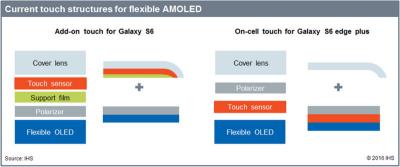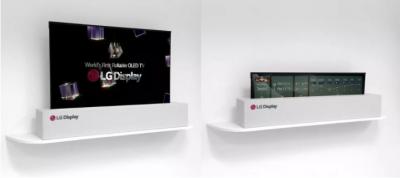OLED Smartphones - introduction and industry news - Page 36
IHS: OLED displays take up over 60% of the total smartphone display market in Q3 2018, by revenue
IHS says that OLED panels take up to 61.1% of the total smartphone display market in Q3 2018, by revenues. OLED sales reached $6.6 billion in the quarter, out of a $10.7 billion market.
The leading OLED producer is still of course Samsung Display - which accounted for 93.3% of the total smartphone OLED panel market (and 94.2% of the flexible OLED panel market). Samsung's OLED dominance also helps it to enjoy a 57.8% market share in the total smartphone market (LCD+OLED) - far ahead of BOE (7.8%) and Tianma (7.7%) which are the 2nd and 3rd largest smartphone display producers.
ETNews: Samsung to supply Apple with Y-OCTA OLEDs for some of its 2019 iPhones
According to Korean publication ETNews, Samsung is aiming to supply Apple with its latest Y-OCTA OLED panels for Apple's 2019 iPhones. Y-OCTA (or Youm On-Cell Touch AMOLED) is Samsung's term for its on-cell touch flexible AMOLED technology. 
Y-OCTA panels are thinner than Samsung's previous flexible Add-On Touch panels as the touch sensor is deposited directly on the encapsulation (TFE) layer. The optical features are also better as the touch layer is below the polarizer and enables the use of a non-ITO grid, there's no need for a support film (see image above) and the number of layers is lower.
CLSA lowers its china smartphone OLED production and adoption forecasts
CLSA says that as OLED displays are too expensive for many smartphone makers and lack enough differentiation to LCDs, the company is lowering its OLED adoption forecasts. CLSA now expects China's OLED smartphone shipments to total 116 million in 2018, 143 million in 2019 and 168 million in 2020. CLSA lowered its forecasts by 12-21%. In terms of penetration into the total Chinese smartphone market, CLSA sees 14% in 2018, 18% in 2019 and 21% in 2020.

Looking at the OLED makers, side, CLSA sees ample OLED supply in coming years, which means that expansion is likely to slow. CLSA assumed that OLED makers will achieve 70% yields and a utilization rate of 90%, which will bring all OLED makers to have a combined production capacity of around 288 million 6" panels in 2020. As demand will be only 168 million by Chinese phone makers (and remember there's also Samsung and LGD of course), this will create quite an oversupply situation in China. CLSA cuts its China OLED production forecasts by BOE, Tianma, Visionox, CSoT and Everdisplay by 23% to 26% in coming years.
Users complain about the quality of LGD's pOLED used in the Google's Pixel 3
Google's 2017 Pixel 2 XL was one of the first phones to adopt LG Display's pOLEDs (6" 1440x2880) - and initial reviews of the display were rather dismal - as both reviewers and customers complained about bad color reproduction, graininess and problematic viewing angles. Many users also reported serious image retention issues.
![]()
In 2017, Google used Samsung's Super AMOLED displays in the smaller in 2017. This year, for the 2018 Google Pixel 3, Google chose SDC's 6.3" 1440x2960 Super AMOLED for the larger Pixel 3 XL - with proved to be a top-notch display. For the smaller Pixel 3, Google picked LG Display's 5.5" 1080x2160 - probably hoping that LGD managed to improve its displays - and most importantly its quality controls.
Google details OLED power consumption, shows how Android's dark mode can help extend your battery life
As OLED is an emissive display technology, an OLED pixel only draws power when it is used - and the brighter it is, the more power it consumers. This of course means that adopting a dark UI is better for your device's power life.
![]()
During Google's recent Android Dev Summit, the company detailed the power consumption of the OLED display used in its 2016 Pixel smartphone (an SDC FHD 5" AMOLED). As you can see in the image above, the power consumption is different for each color (with red being the most efficient color and blue the least efficient). Surprisingly the display draws quite a bit of power even when completely black.
Samsung unveiled its upcoming foldable smartphone, with a 7.3" fold-in AMOLED
As expected, Samsung unveiled its upcoming foldable smartphone yesterday. The rumors were correct, and Samsung's first foldable device will have two screens - a large 7.3" foldable AMOLED that folds inside, and a smaller OLED that is used when the phone is closed. Samsung brands the display as the Samsung Infinity Flex Display.

The inner foldable display is a 7.3" AMOLED with a resolution of 1532x2152 (361 PPI). The outer display is a 4.5" 840x1960 AMOLED. The whole device seems to be quite thick and about double the depth compared to a standard smartphone.
ETNews: LGD to start shipping OLED panels to Apple in December 2018
According to ETNews, Apple has contracted LG Display to start producing OLED panels for its smartphones. LG Display will produce the new OLEDs at its E6 production line in Paju, and will start shipping panels to Apple in December 2018.

The report says that LGD will ship around 400,000 panels to Apple by the end of 2018. The cost of each panel is around $90. This deal is important for LGD, and also for Apple as it wants to diversify its OLED supplier base. According to other reports, these LGD panels will only be used as repair panels by Apple, and will not be integrated into new iPhones.
Will Samsung reveal its first foldable device today?
Samsung's annual US developer conference is starting today, and rumors suggest that the company will unveil its first foldable device (the Galaxy F?) during the event. Samsung Mobile's Facebook page profile image was changed today to the one you see below - which surely suggests something foldable:

Hopefully we'll know more soon. For a few months now we hear that Samsung foldable device launch will take place in November, and according to the latest estimates the device will sport a 7.3" OLED display that folds inside. The device will also sport an external, smaller AMOLED.
The problematic AMOLEDs in Huawei's Mate 20 Pro are actually made by LGD, not BOE
Last week we reported that some Huawei Mate 20 Pro complain about a green tint in the smartphone's 6.39" 1440x3120 AMOLED display.

In our original post we reported that these displays are produced by BOE. However, according to Hernán Castañón (@hema), Huawei actually uses OLEDs produced by both LG Display and BOE - and all the faulty phones are one that use LGD made panels.
LG to bring a rollable OLED TV and a foldable OLED phone to CES 2019
LG Electronics demonstrated its 65" rollable OLED TV prototype in 2018, showing how such a display can be used to create a TV that rolls into its base.

Engadget says that LG has plans to showcase a rollable TV again in CES 2019 (January 9-11). Engadget says that according to its information the rollable TV will take "center stage" in next year's event - which may point to the fact that LG is close to commercializing such a TV. In 2017 LGD did say it plans to bring rollable OLED TVs to market by 2020.
Pagination
- Previous page
- Page 36
- Next page



